As you consider diversifying your bearded dragon's diet, you might wonder about incorporating bananas. While they're packed with important nutrients like Vitamin C and potassium, beneficial for your pet's health, it's essential to weigh the advantages against the potential drawbacks. Bananas' high sugar content and imbalanced phosphorus-to-calcium ratio could pose risks if not fed in moderation. So, how can you safely introduce bananas into your bearded dragon's diet without compromising their well-being? Let's explore the careful balance required to leverage the benefits while mitigating the risks, ensuring your reptilian companion thrives.
Key Takeaways
- Bearded dragons can eat bananas sparingly, once or twice a month, due to high sugar content.
- Bananas provide essential vitamins like A and C, potassium, and antioxidants beneficial for health.
- High phosphorus to calcium ratio in bananas poses a risk, potentially leading to metabolic bone disease.
- Feeding bananas in small quantities as an occasional treat helps avoid obesity and other health issues.
- It's crucial to maintain a varied diet, with bananas as a minor part, to ensure overall health and nutrition.
Banana Nutrition Overview
Bananas pack an important punch, offering essential vitamins and minerals essential for health, though their high sugar content warrants caution when considering them for bearded dragons. Their nutritional value can't be overstated, as they're a good source of carbohydrates, specifically providing 22.84g per 100g serving, which aids in digestion thanks to their 2.6g of fiber. Additionally, bananas bring to the table 1.09g of protein, supporting the overall well-being of your scaly friend.
A notable feature of bananas is their rich provision of essential minerals like potassium, with 358mg per serving, and magnesium at 27mg, which contribute to muscle function and heart health. They're also packed with vitamins such as Vitamin C, offering 8.7mg, and Vitamin A at 64 IU, bolstering immune health and vision.
However, it's important to remember that bananas have a high sugar content, which can be a concern for bearded dragons if consumed in large quantities. Furthermore, their calcium content is relatively low, at just 5mg per 100g, suggesting that bananas should be fed in small amounts to avoid nutritional imbalances.
Feeding Guidelines
When considering your bearded dragon's diet, you can include bananas sparingly, no more than once or twice a month, to prevent health complications. Bananas should be fed in small quantities due to their high sugar content and the potential for calcium depletion. This caution is vital in maintaining your pet's overall health and avoiding obesity, which can be a serious issue in captive bearded dragons.
It's essential to monitor for signs of metabolic bone disease (MBD), a common health problem in reptiles that can be exacerbated by improper nutrition. MBD can result from an imbalance in calcium, phosphorus, and vitamin D3, which bananas, if overfed, can contribute to due to their lower calcium to phosphorus ratio. Feeding bananas in moderation, as part of a varied diet that includes a range of fruits and vegetables, helps minimize this risk.
Potential Health Benefits
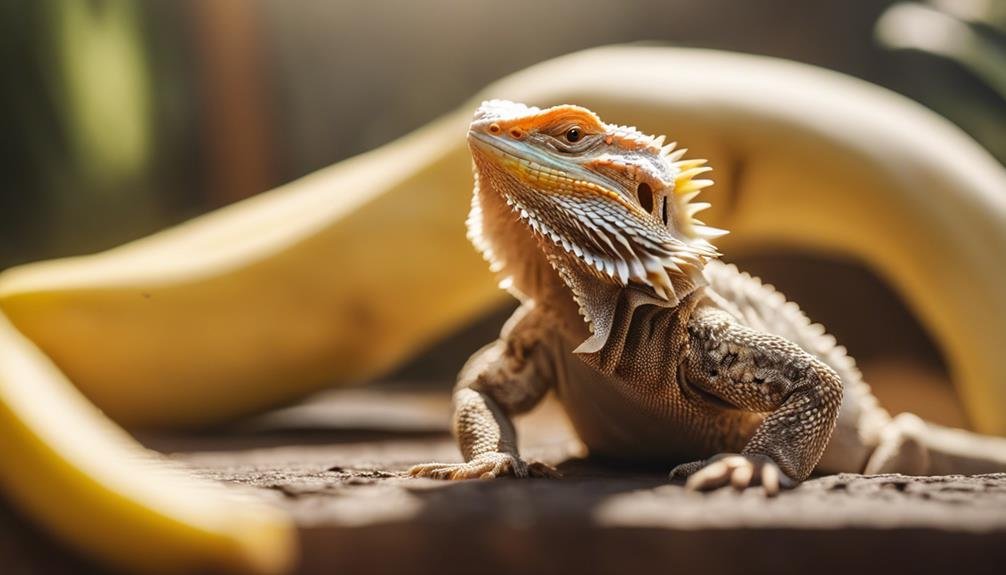

Offering your bearded dragon bananas can provide them with essential nutrients, including vitamins A and C, potassium, and antioxidants, which support their overall health. These components play an important role in maintaining your pet's well-being. The vitamins found in bananas contribute to a strong immune system, helping your dragon fight off illnesses more effectively. Potassium, on the other hand, is essential for proper muscle function and hydration, ensuring your bearded dragon stays active and healthy.
Additionally, the fiber present, especially in banana peels, can be a great way to prevent constipation, a common issue in bearded dragons. It aids in digestive health, ensuring that your pet's gut functions smoothly. Ripe bananas, in particular, offer more of these nutritional benefits compared to their unripe counterparts, making them a better choice for your dragon's diet.
The antioxidants in bananas also play an important role. They aid in cell repair and prevent illness by combating free radicals in your bearded dragon's body. Including bananas in moderation as part of a varied and balanced diet can contribute significantly to the health and happiness of your pet, ensuring they get a mix of all these essential nutrients.
Risks and Concerns
While providing your bearded dragon with bananas can boost their nutrient intake, it's important to be aware of the potential health risks associated with their high phosphorus to calcium ratio. This imbalance can lead to calcium depletion in your pet's body, which is a direct path to metabolic bone disease. This condition manifests through several alarming signs, including a softening of the jaw bones, stunted growth, and even swollen rear legs. These symptoms aren't only distressing but can have a substantial impact on your bearded dragon's quality of life.
Moreover, bananas are high in sugar, which poses another set of problems. Excessive intake of sugary foods can contribute to obesity in bearded dragons, a condition that's as harmful to them as it's to humans. Obesity in these reptiles can lead to a host of health issues, further complicating their care.
To mitigate these risks, it's advisable to limit banana consumption to once or twice a month. Also, ensuring a variety of fruits and vegetables are included in their diet can help maintain a balanced and nutritious feeding regime, essential for your bearded dragon's health and well-being.
Serving Banana to Beardies
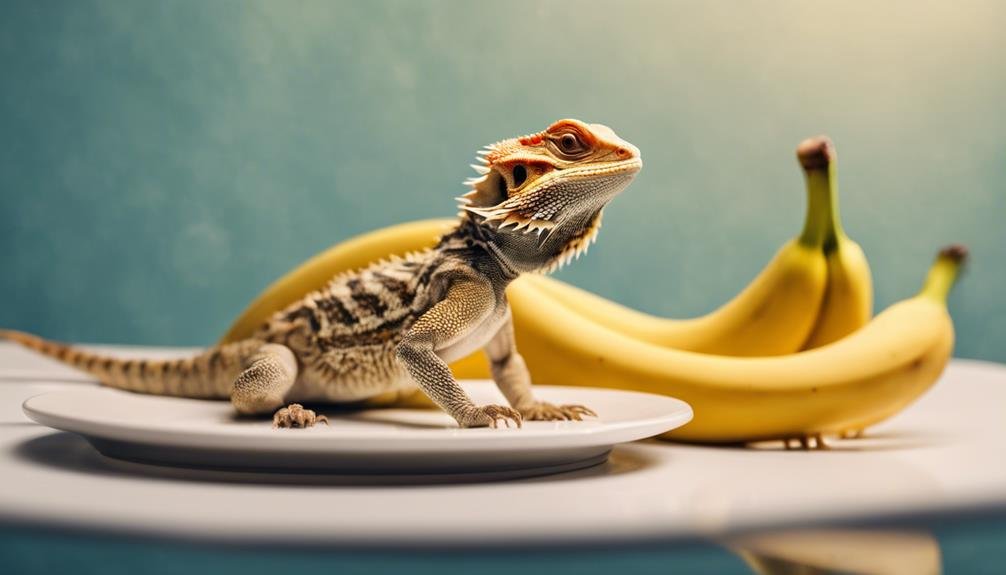

Now that you're aware of the potential benefits and risks of feeding bananas to your bearded dragon, let's focus on how you can properly serve this treat.
You'll need to take into account the serving size and preparation tips to guarantee your beardie enjoys this snack safely.
Keeping these factors in mind will help you incorporate bananas into their diet without any issues.
Banana Serving Size
To guarantee your bearded dragon's health, it's important to limit their banana intake to small slices as an occasional treat. The essential banana serving size is vital to avoid health issues, such as obesity, which can arise from overfeeding.
Remember, moderation is key when including bananas in your beardie's diet. Offering large quantities can disrupt their balanced diet, which should consist of a variety of fruits and vegetables alongside their main diet of insects.
Ensuring you keep banana servings small and infrequent helps maintain the nutritional balance needed for your bearded dragon's well-being. By sticking to these guidelines, you'll ensure your pet enjoys the benefits of bananas without the risk of diet-related health problems.
Preparation Tips
After understanding the importance of serving sizes, let's explore how to properly prepare bananas for your bearded dragon. You can serve bananas with or without the peel, but always in small pieces to prevent choking and aid digestion. Feeding a peeled banana guarantees there's no risk of pesticide ingestion, yet leaving the peel on can offer added nutrition.
Whether you choose to leave unpeeled bananas in the cage for a day or two or feed your bearded dragon by hand, the method depends on what's best for you both. Remember, slicing bananas into small pieces not only makes it easier for them to eat but also helps promote a balanced diet. Always vary the treats to keep your bearded dragon healthy and happy.
Quantity and Frequency
Considering the health of your bearded dragon, you should treat bananas as an occasional snack, limiting their intake to a few slices every other week. In the domain of bearded dragon care, it's important to remember that while bananas can be a delightful treat, they should only play a small role in their diet. This moderation is key to avoiding health issues that can arise from too much of a good thing.
| Aspect | Recommendation |
|---|---|
| Frequency | Every other week |
| Quantity | A few slices |
| Type | Fresh over frozen for higher nutritional value |
| Diet Integration | Part of a varied diet, not a staple |
Avoiding large quantities is essential because bananas, despite their nutritional benefits, also contain sugars and phosphorus, which, in excess, could lead to health problems for your bearded dragon. A balanced diet, incorporating a variety of foods, is vital for their overall health and wellbeing. This controlled approach ensures that your bearded dragon enjoys the benefits of bananas without the risk of nutritional imbalances.
Alternative Fruits
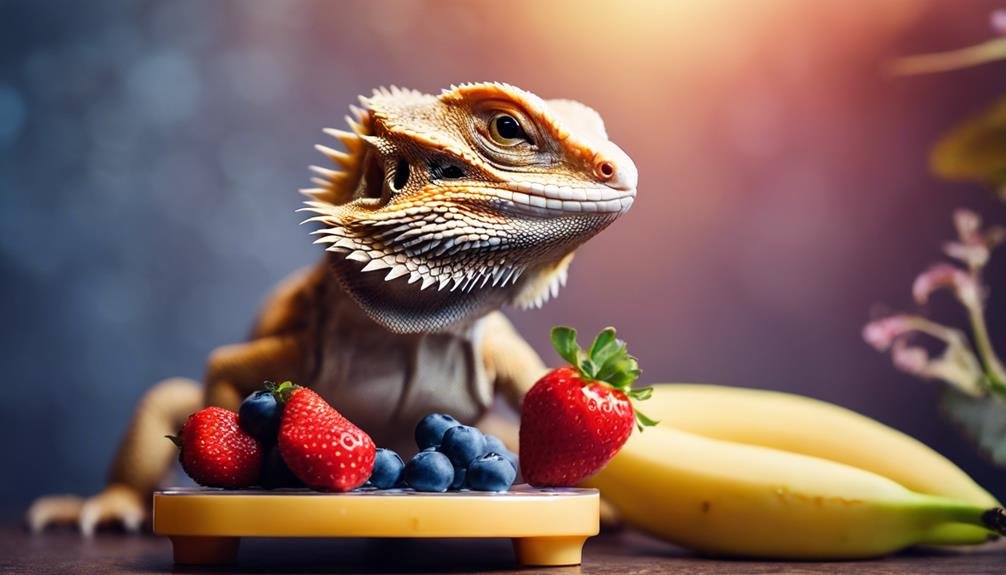

Now that you're familiar with how often and how much to feed bananas to your bearded dragon, let's explore some alternative fruits.
We'll cover which fruits are recommended for their health benefits and which ones to steer clear of to maintain your pet's health and happiness.
This will guarantee you're offering a balanced and nutritious diet beyond just bananas.
Recommended Fruit Options
To ensure your bearded dragon enjoys a well-rounded diet, consider incorporating alternative fruits like papaya, mango, and berries for nutritional diversity. These options not only provide essential vitamins and minerals but also add variety to their meals, ensuring both adult bearded dragons and baby bearded dragons eat a balanced diet.
While it's important to prioritize leafy greens and insects as the main components of their diet, adding a moderate amount of these fruits can enhance their nutritional intake without the risks associated with high-sugar options.
Always consult a reptile veterinarian to tailor a diet plan that best suits your bearded dragon's needs, focusing on a mix of vegetables, insects, and selected fruits to maintain their health.
Fruits to Avoid
While it's crucial to diversify your bearded dragon's diet with fruits, you must steer clear of high-sugar options like bananas to avoid health issues. Offering alternatives that are much lower in sugar can prevent digestive disturbances and guarantee a balanced diet. Keep an eye out for any signs of allergies when introducing new fruits.
Here's a quick guide to healthier alternatives:
| Fruit | Reason to Choose |
|---|---|
| Blueberries | Lower in sugar, rich in antioxidants |
| Papayas | Moderately sweet, high in vitamins |
| Bell peppers | Low in sugar, full of vitamins |
| Butternut squash | Low sugar, high in dietary fiber |
Choosing these options over bananas helps maintain your bearded dragon's health without the risk of too much sugar.
Special Considerations
Before integrating bananas into your bearded dragon's diet, it's important to contemplate their high sugar content and the potential health risks associated with their phosphorus to calcium ratio. The imbalance in Calcium to Phosphorus can lead to metabolic bone disease (MBD) and calcium depletion, which are serious health concerns. When you do decide to feed bananas, consider dusting the fruit with calcium powder to help mitigate the risk. However, this doesn't mean you should make bananas a staple; they're best enjoyed as an occasional treat.
It's also worth noting that while banana peels aren't toxic to bearded dragons, they're not recommended due to potential pesticide exposure and tough texture, which can be difficult for your dragon to digest. Offering a variety of fruits and vegetables, beyond just bananas, is key to ensuring a balanced diet and overall health.
Understanding the impact of bananas on your dragon's digestive system is essential. Their high sugar content can lead to digestive issues if consumed excessively. Always consult with a reptile veterinarian for guidance on how to incorporate fruits like bananas into your bearded dragon's diet responsibly, ensuring their health and wellbeing aren't compromised.
Related Dragon Care
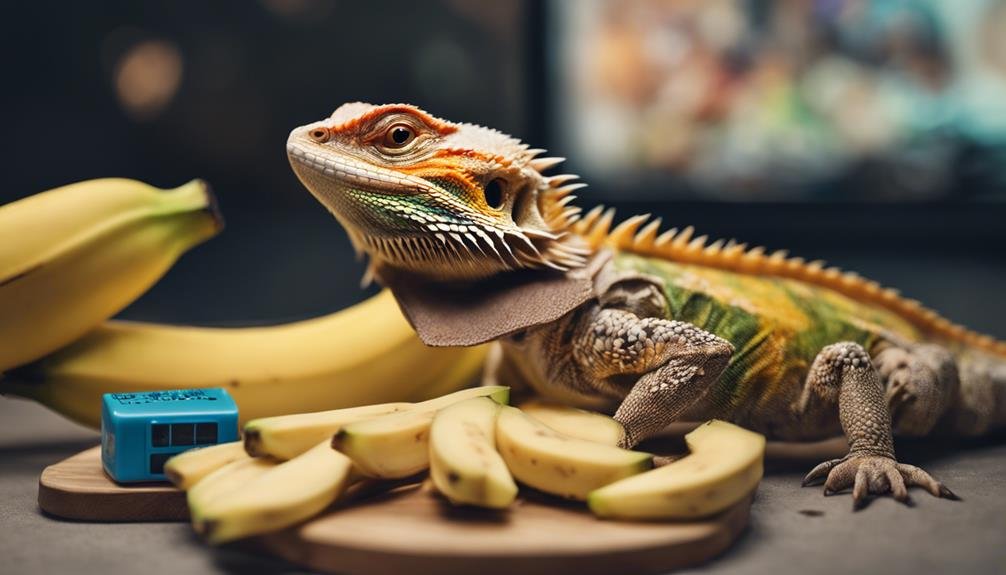

Ensuring your bearded dragon thrives involves more than just monitoring their fruit intake; it requires a holistic approach to their overall care and diet. While it's true that bearded dragons can eat bananas, these should be a rare treat rather than a staple. To keep your dragon healthy and happy, focus on a diet that mirrors their natural habitat as closely as possible. Here's a quick guide:
- Variety is Key: Integrate a wide range of foods for bearded dragons, emphasizing leafy greens and vegetables over fruits. Plant matter should form the bulk of their diet, providing essential nutrients without the high sugar content found in bananas.
- Limit Sugary Treats: Although dragons can eat bananas, these high-sugar fruits should be given sparingly to avoid obesity and metabolic bone disease. Prioritize foods that support their well-being.
- Consult a Professional: A reptile veterinarian can help you craft a balanced diet plan, ensuring your bearded dragon receives all the necessary nutrients. They can guide you on the right mix of plant matter, insects, and the occasional fruit treat like bananas.
Can Feeding Bananas to Bearded Dragons Affect Their Happiness and Wellbeing?
Feeding bananas to bearded dragons can affect their happiness and wellbeing. While they can eat bananas, they should be given in moderation. Too many can lead to obesity and digestive issues. However, there are other ways to improve wellbeing, such as providing a balanced diet and regular exercise.
Frequently Asked Questions
Why Can't Bearded Dragons Eat Bananas?
You can't feed bearded dragons bananas frequently because the high phosphorus ratio to calcium can lead to calcium depletion, risking metabolic bone disease. The potassium content isn't the issue; it's the sugar and phosphorus levels that upset their nutritional balance.
To avoid health problems, you must limit the feeding frequency to once or twice a month. This maintains their nutritional balance without causing obesity or calcium-related health issues.
What Foods Are Bad for Beardies?
When considering what foods are bad for beardies, you've got to watch out for those low in calcium and high in phosphorus, disrupting their calcium needs. Foods low in water content can also be problematic, as hydration is key.
Their diet should primarily focus on insects, tailored to their nutritional needs. Don't forget, the temperature impact is essential for digestion.
Avoid overfeeding sugary or fatty foods to prevent health issues.
What Fruit Is Toxic to Bearded Dragons?
You need to watch out for several fruits that are toxic to bearded dragons, including avocados due to their toxicity, citrus fruits because of the risks they pose, tomatoes which raise concerns, and certainly grapes due to their hazards.
These can cause serious health issues, so it's best to avoid them. Instead, focus on safe fruits and veggies that won't harm your bearded dragon's health.
Why Wouldn't a Bearded Dragon Eat?
Your bearded dragon mightn't be eating due to several reasons. Health issues like mouth rot or impaction can seriously affect their appetite.
Stress factors, such as a new environment or improper handling, can also make them reluctant to eat.
Temperature problems within their habitat might discourage feeding.
Additionally, age-related appetite changes occur, with younger dragons eating more than older ones.
It's important to address these issues to guarantee their well-being.
Conclusion
To sum up, you can definitely give your bearded dragon bananas, but do it sparingly. Their sugar content and phosphorus to calcium ratio mean they're a treat, not a staple.
Including bananas as a small part of a varied diet helps tap into their benefits, like boosting immune health, without risking calcium depletion. Remember, it's all about balance.
Offer bananas in tiny amounts and explore other fruit alternatives to keep your beardie healthy and happy.

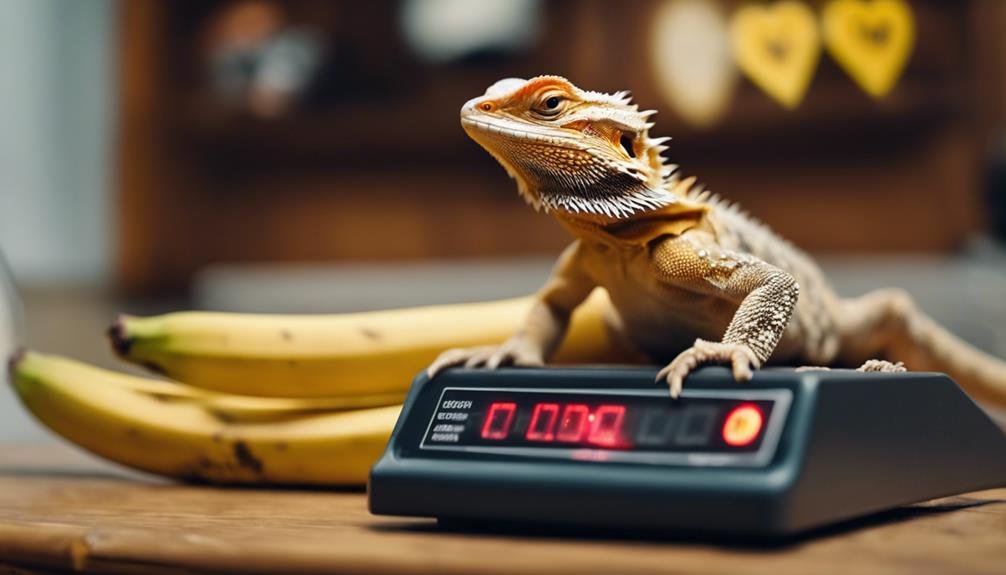

[…] is recommended to avoid giving bearded dragons bananas to eat, as they are high in sugar and can lead to health issues. If you are considering feeding […]